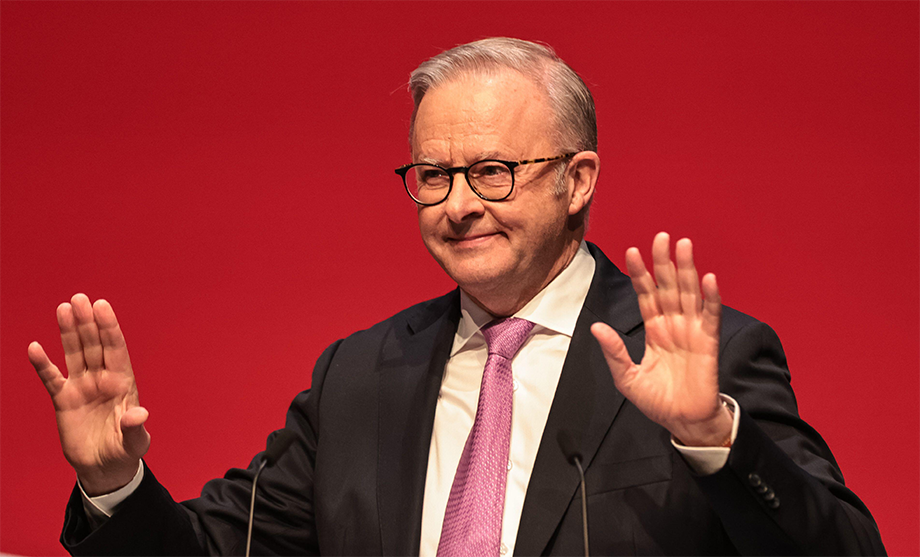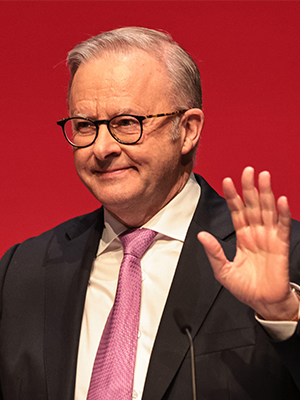
- Free Article: No
- Contents Category: Commentary
- Custom Article Title: ‘Albanese’s ‘Australian Way’: The rise of ‘progressive patriotism’ and its complex past’
- Review Article: Yes
- Article Title: Albanese’s ‘Australian Way’
- Article Subtitle: The rise of ‘progressive patriotism’ and its complex past
- Online Only: No
- Custom Highlight Text:
‘To the victor belongs the spoils.’ The adage is attributed to William Macy, New York senator and defender of Jacksonian democracy. The aftermath of victory allows one to frame significance, settle scores, and proclaim lessons that will justify and guide a new government.
- Article Hero Image (920px wide):

- Article Hero Image Caption: Prime Minister Anthony Albanese speaks during the Labour Party Annual Conference, Liverpool, 2025 (News Images/Alamy)
- Alt Tag (Article Hero Image): Prime Minister Anthony Albanese speaks during the Labour Party Annual Conference, Liverpool, 2025 (News Images/Alamy)
Dismissed from office in 1975, in the subsequent election campaign Whitlam faced Malcolm Fraser’s promise to ‘Turn on the Lights, Australia’. Fraser used his thumping victory to cement the judgement that Australia’s economic downturn could be ascribed solely to Labor’s mismanagement and haste. In post-election interviews, Fraser committed to ‘establish a situation in which the economic future of individuals, of families, is predictable’.
And so it goes. Elected amid high unemployment and inflation, Bob Hawke promised ‘national reconciliation’ as a prelude to ‘national recovery’ and ‘national reconstruction’. His party’s win in 1983 was followed by a National Economic Summit and more than a decade of feverish economic change.
When John Howard became Australia’s prime minister in 1996, he celebrated the lifting of an alleged ‘pall of political correctness’. He identified a new political constituency – ‘Howard’s battlers’ – an ill-defined group of suburbanites, small businesspeople, and tradesmen, who had come to support the Liberal Party. Howard’s words presaged years of culture wars and an economic policy that would handsomely reward those who ran businesses and owned property.
Given these many precedents, Anthony Albanese’s efforts to explain Labor’s 2025 landslide are revealing. The Australian Labor Party commands ninety-four of 150 seats in the House of Representatives, but its primary vote was little more than one in three electors: 34.56 per cent. Albanese therefore has both an authority to explain success and an incentive to frame the election in the most positive and consequential terms. His words provide clues as to future interventions. They merit close analysis.
From the official announcement in late March of the impending general election, the Labor leader consistently presented his campaign as the pursuit of an ‘Australian way’. He launched his bid for return by claiming that ‘Our government has chosen to face global challenges the Australian way’. Along with the related term ‘progressive patriotism’, ‘the Australian way’ served as a touchstone on the campaign trail. The theme was underlined as Albanese basked in success. The returned prime minister promoted the concept in interviews in May that followed his electoral triumph. He reinforced the point in a John Curtin Oration in early July. By this stage sympathetic commentators had begun to take up the message, seeking to trace the concept’s lineage in the writings of social democrat figures in Australia and elsewhere.
Ubiquity, of course, does not confer clarity. What, exactly, does it mean to pursue an ‘Australian way’? Like the somewhat related notion of ‘Australian values’, the concept of an ‘Australian way’ threatens to dissolve into a self-congratulatory blur: equality, practicality, and all that. For some, the concept might be little more than a convenient slogan: a screen upon which any leader might project their favoured virtues. Peter Dutton himself used the term in late 2024. Dutton’s Christmas message commended citizens for their capacity to contend with ‘financial pressures’: ‘Australians carried on with stoicism – as is the Australian way’.
Still, if the concept might be used in many forms, Albanese’s uses have so far been relatively consistent and disciplined. For the Labor leader, the ‘Australian way’ appears to signify four related notions.
First, ‘the Australian way’ subtly invokes an alternative to Trump’s America. Though implying rather than explicitly identifying the American president, Albanese has consistently linked an ‘Australian way’ to ‘not looking towards any other method or ideology from overseas’. Across the 2025 election campaign, he portrayed Dutton and the Liberal Party as borrowing ‘a range of ideas’ from ‘elsewhere’ (read ‘America’). Then Coalition frontbencher Jacinta Nampijinpa Price’s promise to ‘Make Australia Great Again’ underlined this theme.
Albanese’s rhetoric served well as a campaigning tool, for many Australians are revolted by unfolding events in the American republic: the flouting of norms, the authoritarian turn, the deliberate polarisation. But if to follow the ‘Australian way’ is to refuse to imitate Trump, then what else does this imply?
Unquestionably, Albanese has also linked an ‘Australian way’ to values of social solidarity and mutual support. In a succession of speeches and interviews, he has argued that it implies ‘kindness’, ‘looking after each other’, and treating people with ‘respect’. Medicare, Australia’s system of public health insurance, is for Albanese the primary symbol of this ‘Australian way of life’. From Albanese’s perspective, Labor’s election victory is therefore a vindication of the principles of mutual care and compassion. Whether this may provide a basis for efforts to foster greater social fairness remains an open question.
The third consistent element of Albanese’s ‘Australian way’ is its strikingly positive vision of the nation. This is a revival of an old Labor theme. Across the nineteenth century and all the way up to the 1970s, the Australian left was largely committed to a radical nationalism: an association of Australians with equality, fraternity, and the quest for self-government; a rejection of Britain (and then America) as a threat to self-rule and an agent of economic exploitation. This vision predated the formation of Labor parties and transcended party politics, but Labor governments consistently claimed to carry its spirit into office.
Radical nationalism was directly tied to a White Australia. Though racism was always opposed by some Australians – especially its victims – by the 1960s the contrast between an alleged Australian equality and persistent and open discrimination became more difficult to reconcile. Over recent decades, national history has been rewritten. Breast-beating patriotism is hard to sustain without a white blindfold. A fuller reckoning with the horrors of the colonial project, and with its continuing legacies, has increasingly sundered the left from its past celebration of an Australian way.
The left’s reticence has been matched by the right’s embrace. The History Wars, waged since the 1980s, have largely reflected the right’s attempts to deny the wrongs perpetrated by colonisers and reinstate a reverence for their achievements. In these polarised debates, the old left’s radical nationalism has largely evaporated.
Albanese’s promotion of a ‘progressive patriotism’ appears to be a response. It affirms the virtues of Australians and of Australian ways. It also revives the past connection between ‘Labor’ and ‘nation’, thereby reclaiming the ‘nation’ for the party and for the broader left. In his John Curtin Oration the prime minister even went so far as to explicitly identify ‘the Labor way’ with ‘the Australian way’.
If ‘the Australian way’ is to be celebrated, this does raise the question of whether any further reform is necessary. Patriotism can serve as a rationale for self-satisfaction – ‘Love it or leave it’ – and for the denial of social problems.
The final element of Albanese’s version of an ‘Australian way’ is a partial answer, for it suggests a tradition of dynamism and experiment. Albanese has described the ‘Australian way’ as a ‘project’ rather than a fixed set of arrangements. He has also portrayed the Labor Party as the site of a ‘creative tension’: the party has a ‘love’ of its history, Albanese says, but also seeks to ‘build on it’.
What might this mean in practice? The generations that forged an ‘Australian way’, in Albanese’s sense, were focused on the pursuit of economic equality. They pioneered a minimum wage and limitations on time at work. They promoted the eight-hour day and a full weekend as the basis of the good life. They understood their reforms as an opposition to the market in the pursuit of fairness.
As Chief Justice of the Commonwealth Court of Arbitration, H.B. Higgins reduced the hours of work in 1920, arguing that this was necessary to ensure that Australia remained ‘the leader of industrial betterment’ across the globe. Over the first half of the twentieth century, Labor leaders legislated for a forty-eight-hour week, a forty-four-hour week, and then a forty-hour week. When they were voted out and their laws were rescinded, they fought for re-election and reimposed them.
Contemporary Australians currently face rising inequalities of wealth and income and longer time at work. On average, the Australia Institute reports, full-time employees work 4.1 hours of unpaid overtime every week. A recent comparison by the Organisation for Economic Co-operation and Development ranks the ‘work-life balance’ of Australians as seventh-worst of thirty-eight member states. The burdens weigh particularly on Australian women, who also shoulder the bulk of domestic labour.
The nation has long ceded its past position as the ‘leader of industrial betterment’. Does Albanese’s invocation of an ‘Australian way’ signal some readiness to revive deliberate and sustained reform of our working lives? In the face of creeping overtime, arguments for industrial reform are increasingly coalescing around the idea of a four-day working week.
When the leaders of the Australian Council of Trade Unions recently advocated the ideal of a ‘four-day week’, the prime minister’s response was not encouraging. ‘I think a lot of people would like to have a five-day working week,’ he stated. Such a summary dismissal would have invited scornful rebuke had it been delivered by a conservative leader.
But there is another, equally pressing question that needs attention if Albanese’s conception of ‘progressive patriotism’ is to be more than a convenient slogan. Gathering at Uluru in 2017, members of Australian First Nations shared the Uluru Statement from the Heart: an invitation to all Australians to forge a better Australian way, characterised by a commitment to ‘Voice, Treaty, Truth’.
It would be difficult to imagine a political initiative more complementary to the notion of Australia as a collective ‘project’, striving towards greater justice. Yet since the defeat of the referendum on an Aboriginal and Torres Strait Islander Voice, the prime minister has been largely silent on these matters. It is currently unclear how Voice, Treaty, and Truth might form part of Albanese’s vision of a reformed Australia.
In his evocation of an ‘Australian way’ and a ‘progressive patriotism’, Anthony Albanese has revived some traditional themes in Australian labour politics and has given them a new inflection and possible relevance. His willingness to walk the talk is so far less evident.
It is probably up to those outside the Labor Party’s formal leadership to push the federal government to do more than talk, and to move from words to deeds. Those with a knowledge of Australian history may be tempted to note that the necessity for pressure from below is not a new requirement; it is also a familiar aspect of ‘the Australian way’.



Comments powered by CComment